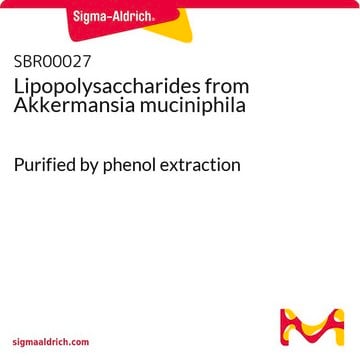The serotype is OX19.
SMB00801
Lipopolysaccharides from Proteus vulgaris
purified by phenol extraction
Sinónimos:
LPS
Seleccione un Tamaño
238,00 €
Seleccione un Tamaño
About This Item
238,00 €
Productos recomendados
origen biológico
bacterial (Proteus vulgaris)
Nivel de calidad
Formulario
lyophilized powder
purificado por
phenol extraction
impurezas
≤3% Protein (Lowry)
color
white to yellow cast
solubilidad
water: 4.90-5.10 mg/mL, faintly hazy to hazy, colorless to faintly yellow
Condiciones de envío
ambient
temp. de almacenamiento
2-8°C
Descripción general
Proteus vulgaris is a rod-shaped Gram-negative, facultative anaerobe bacterium. It inhabits the intestinal tract of humans and animals and can be found in soil, water and feces.[1] P. vulgaris is a member of the Enterobacteriaceae family which are opportunistic pathogens in humans, responsible for urinary tract and burn infections.[2]
The chemical structures of LPS from Proteus sp. are different from each other.
Acciones bioquímicas o fisiológicas
Otras notas
Producto relacionado
Código de clase de almacenamiento
11 - Combustible Solids
Clase de riesgo para el agua (WGK)
WGK 3
Punto de inflamabilidad (°F)
Not applicable
Punto de inflamabilidad (°C)
Not applicable
Elija entre una de las versiones más recientes:
Certificados de análisis (COA)
¿No ve la versión correcta?
Si necesita una versión concreta, puede buscar un certificado específico por el número de lote.
¿Ya tiene este producto?
Encuentre la documentación para los productos que ha comprado recientemente en la Biblioteca de documentos.
Artículos
Explore the structure, function, and diverse applications of Lipopolysaccharides. Discover their role in bacteria, serological specificity, and research potential.
-
What is the serotype of Proteus vulgaris used for this LPS?
1 respuesta-
¿Le ha resultado útil?
-
-
Which O-antigen does that P.vulgaris come with? And from which strain was the LPS isolated?
1 respuesta-
The o-antigen is O-polysaccharide. The strain is considered proprietary. Please see the link below for additional information that may be helpful.
https://pubmed.ncbi.nlm.nih.gov/9858461/The link below offers additional information to all of the lectin products, as well as a helpful selection guide:
https://www.sigmaaldrich.com/technical-documents/technical-article/research-and-disease-areas/glycobiology/lectin-selection-guide-useful-guide-for-selecting-right-lectin#lectin¿Le ha resultado útil?
-
Filtros activos
Nuestro equipo de científicos tiene experiencia en todas las áreas de investigación: Ciencias de la vida, Ciencia de los materiales, Síntesis química, Cromatografía, Analítica y muchas otras.
Póngase en contacto con el Servicio técnico



